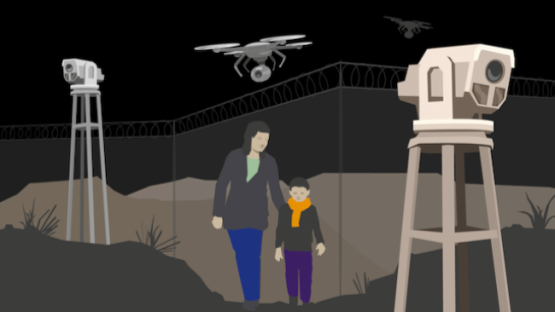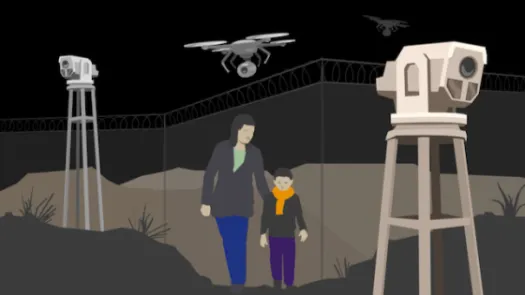
International Migrants Day 2024 - A Year in Review
On International Migrants Day, we reflect on wins and losses in the fight against violations of migrants’ rights.

18th December is International Migrants Day, a day to recognize both the contributions and continued struggles of migrants across the world.
Migrants continue to face an increased level of human rights violations through hostile immigration policies and practices. At borders and beyond, their fundamental human rights and dignity are being violated through old and new technologies. These systems in place reinforce the dehumanising rhetoric of migrants, who are merely seeking asylum and a better standard of living.
We take this day as an opportunity to highlight some of the achievements and efforts we’ve taken against governments’ hostile and undignified practices against migrants. Looking back on 2024, we have been putting up a steadfast fight against the hostile use of technology and other decision-making models that work against migrants, from the ICO’s breakthrough decision early this year on the GPS tracking of migrants to the use of AI in migration decision making and in border control to new electronic monitoring technologies, among other work.
Here is what’s been happening:
GPS Tagging of Migrants: Ruled unlawful and a breach of human rights
Since 2021, the Home Office has been placing migrants released on immigration bail under GPS ankle tagging, subjecting them to 24/7 surveillance. In 2022, this practice expanded to “all asylum claimants who arrive in the UK via unnecessary and dangerous routes”.
On 1 March 2024, the ICO (the UK’s Data Protection Authority) found that the UK Home Office’s GPS tagging of migrants arriving to the UK by small boats and other “irregular” routes was unlawful. The decision results from Privacy International’s complaint from August 2022.
The ICO found that the expansion project had been unlawful as it failed to comply with data protection law in a number of ways. The data protection authority issued an Enforcement Notice and formal warning to the Home Office for widespread breaches of data protection law in its GPS tagging of migrants. The decision is a powerful reminder that migrants have the same data protection rights as everyone else, and that immigration authorities are not above the law. Read more here.
Shortly after this, the Upper Tribunal (Immigration and Asylum Chamber) ruled that the failure of the Home Office to conduct lawful or timely reviews of GPS tagging of an individual constituted a breach of the right to privacy under Article 8 of the European Convention on Human Rights (ECHR) and a public law error.
Another critical ruling this year came from a London Administrative Court in May 2024, for which PI also provided evidence on the technical functioning of the GPS tags and resulting privacy intrusion. The judgment reveals that the significant intrusion of GPS tagging into private lives was not properly justified and the few safeguards that existed against abuses were not complied with. Read more here.
The Home Office’s disregard for migrants’ human rights has become more evident with each ruling. We are closely following the implementation of the rulings as well as the ICO’s enforcement notice by the Home Office.
AI in Migration Decision Making and Border Control
This year, we have also continued to investigate non-transparent and secretive algorithms and AI decision-making systems used by the Home Office. The latest breakthrough we’ve uncovered is the "Identify and Prioritise Immigration Cases” (IPIC) tool, which automatically identifies and recommends migrants for particular immigration decisions or enforcement action by the Home Office.
It took us a year of submitting FOIA requests and eventually complaining to the ICO for the Home Office to disclose information about the functioning of this AI tool. However, the Home Office withheld critical disclosures of how the tool determines actions and decisions affecting migrants’ lives, arguing that migrants would ‘game’ the system if they knew how it worked.
It is clear from internal documentation we have received that this algorithm is being used across the immigration system. With such a confirmation that the Home Office is indeed utilising an opaque algorithm to determine the immigration decisions of migrants, we urge for further transparency and meaningful explainability about the existence and functions of algorithmic decision-making systems. Read more about this tool in our analysis here.
Nonetheless, there might be promising options ahead. The UK government has announced earlier this year that greater transparency on algorithm-assisted decision making in the public sector use would become a requirement for all central government departments under the Algorithmic Transparency Recording Standard. As for how this will be enforced, PI will monitor the outcome of this transparency standard and continue to advocate for these promises to be delivered effectively.
New Electronic Monitoring Technologies
Another investigation we conducted this year was focused on an emerging new monitoring technology. The Home Office has since late 2022 been issuing so-called non-fitted devices (NFDs) to those on immigration bail and who are subject to electronic monitoring conditions. NFDs appear to be issued after an individual has undergone a period of GPS tagging.
The NFDs supposedly being deployed by the Home Office are GPS fingerprint scanners mounted to an Android device, which tracks a person’s live location at all times and requires immediate fingerprint scans prompted by loud, stigmatising alerts multiple times a day, including in social settings, religious activities, or sleep.
Similar to our previous tech research on GPS ankle tags, this time we conducted another technical investigation into this invasive surveillance technology and its unnecessarily intrusive and dehumanising configuration and deployment. Interviews with individuals subject to these devices have reported that migrants live “in a constant state of alertness and in a heightened sense of being under constant surveillance” in addition to the increased stigmatisation they experience, which brings detrimental impacts to their physical and mental wellbeing. What our research confirmed was that these NFDs indeed appeared to be deployed in unnecessarily intrusive and inhumane ways. To learn more about our technical methodology and what we found in our research, take a look at our investigation here.
As NFDs and other electronic monitoring technology is being rolled out by the Home Office, PI will continue to investigate the abuses perpetrated by the UK Home Office’s wider electronic monitoring arsenal and advocate for an end to these harmful practices.
Last year, we reflected on the past year of 2023 and ended with a note of hopefulness, that some of the hamful practices we reported might no longer be in effect. Perhaps we did see a glimpse of that this year, with the ICO’s ruling of GPS tagging as unlawful. However, we’ve also unearthed a range of new technologies and harmful policies that continue to undermine the rights of migrants and asylum seekers.
We strongly wish for a better year ahead for migrants and all others put in a position of further vulnerability through dehumanising and authoritarian use of technologies. However, this will not be possible until migrants are recognized for their inherent dignity and their contribution to the society, instead of malicious intruders to detect and defeat.
Click here to find out more about our work in this area and sign up to our mailing list to follow our work.



